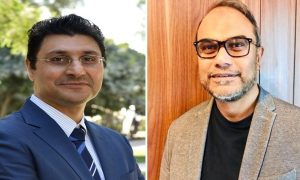A major cluster grant titled “The Future of Digital Citizenship in Qatar: A Socio-Technical Approach” from the Qatar National Research Fund (QRNF) was awarded to HBKU, Qatar University, and many other partners to lead a multi-entity, interdisciplinary project on digital citizenship in the Arab region.
The $3.8m four-year grant was awarded under QRNF’s National Priorities Research Program-Cluster (NPRP-C) and enables collaboration between 10 entities from academia and industry.

Dr. Raian Ali, Professor in Information and Computing Technology at HBKU, will lead the cluster as program director with six projects that will focus on building an observatory for trends and common topics on social media, web-based tools, educational materials, and research into digital literacy and well-being, gender equity, social inclusion, behavior-based approaches to security and safety, detecting and limiting propaganda and other areas.
Qatar University is leading two projects by Dr. Khaled Khan and Dr. Osama Halabi from the Computer Science and Engineering Department, College of Engineering.
The project led by Dr. Khaled Khan is titled ”Security and Safety as a Behavior”. It is a collaborative project between Qatar University, HBKU, and Bournemouth University. The project will research a behavior-based approach to security and safety. Investigate hacking and social engineering techniques that are successful in the Arab world and propose socio-technical approaches to enhance resilience to manipulators online and encourage reporting. The solutions are based on the approaches of behavior rehearsal, simulation, and social norms.
The project is led by Dr. Osama Halabi is titled “GESI by Design”. It is a collaborative project between Qatar University and HBKU. The project will study how to mitigate issues related to Gender Equality and Social Inclusion (GESI) in social media in Qatar and the Arab world and increase awareness of them. The team will use digital nudging techniques based on annotation and a bespoke set of reactions and emojis and devise tools to facilitate a structured dialogue. The aim is to encourage a more civilized and inclusive language and interaction.
The cluster is supported by a wide range of key stakeholders in Qatar including the Ministry of Communication and Information Technology, Qatar National Library, Msheireb Museums, Qatar Finance Centre, and Fadaat Media, who will provide facilities and enrich the knowledge transfer.
